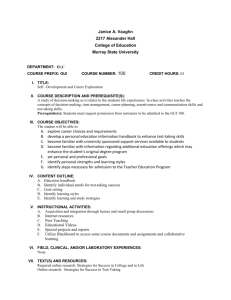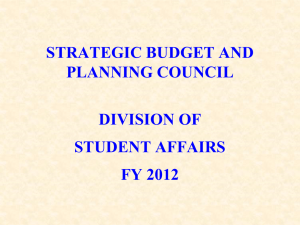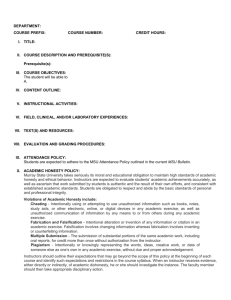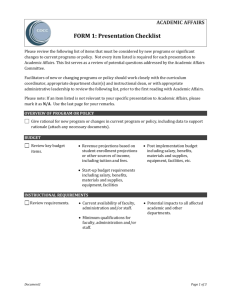Dr. Don E. Robertson 114 Ordway Hall Office phone: 809
advertisement
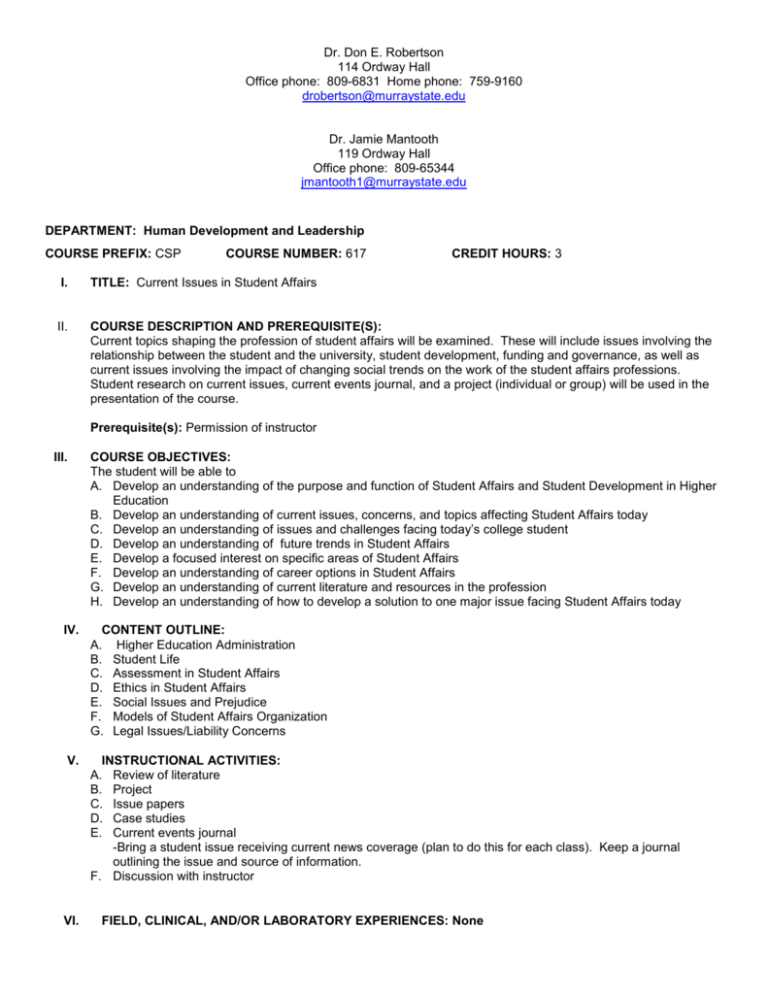
Dr. Don E. Robertson 114 Ordway Hall Office phone: 809-6831 Home phone: 759-9160 drobertson@murraystate.edu Dr. Jamie Mantooth 119 Ordway Hall Office phone: 809-65344 jmantooth1@murraystate.edu DEPARTMENT: Human Development and Leadership COURSE PREFIX: CSP COURSE NUMBER: 617 CREDIT HOURS: 3 I. TITLE: Current Issues in Student Affairs II. COURSE DESCRIPTION AND PREREQUISITE(S): Current topics shaping the profession of student affairs will be examined. These will include issues involving the relationship between the student and the university, student development, funding and governance, as well as current issues involving the impact of changing social trends on the work of the student affairs professions. Student research on current issues, current events journal, and a project (individual or group) will be used in the presentation of the course. Prerequisite(s): Permission of instructor III. COURSE OBJECTIVES: The student will be able to A. Develop an understanding of the purpose and function of Student Affairs and Student Development in Higher Education B. Develop an understanding of current issues, concerns, and topics affecting Student Affairs today C. Develop an understanding of issues and challenges facing today’s college student D. Develop an understanding of future trends in Student Affairs E. Develop a focused interest on specific areas of Student Affairs F. Develop an understanding of career options in Student Affairs G. Develop an understanding of current literature and resources in the profession H. Develop an understanding of how to develop a solution to one major issue facing Student Affairs today IV. CONTENT OUTLINE: A. Higher Education Administration B. Student Life C. Assessment in Student Affairs D. Ethics in Student Affairs E. Social Issues and Prejudice F. Models of Student Affairs Organization G. Legal Issues/Liability Concerns V. INSTRUCTIONAL ACTIVITIES: A. Review of literature B. Project C. Issue papers D. Case studies E. Current events journal -Bring a student issue receiving current news coverage (plan to do this for each class). Keep a journal outlining the issue and source of information. F. Discussion with instructor VI. FIELD, CLINICAL, AND/OR LABORATORY EXPERIENCES: None VII. A. B. C. D. E. TEXT(S) AND RESOURCES: Journal of College Student Development NASPA Journal Appropriate Listserv and Newsgroup discussions Chronicle of Higher Education Current literature in Student Affairs VIII. EVALUATION AND GRADING PROCEDURES: Class participation: Current events journal/discussion Issue papers: Group project : 20% 10% 45% 25% IX. ATTENDANCE POLICY: Students are expected to adhere to the MSU Attendance Policy outlined in the current MSU Bulletin. X. ACADEMIC HONESTY POLICY: Murray State University takes seriously its moral and educational obligation to maintain high standards of academic honesty and ethical behavior. Instructors are expected to evaluate students’ academic achievements accurately, as well as ascertain that work submitted by students is authentic and the result of their own efforts, and consistent with established academic standards. Students are obligated to respect and abide by the basic standards of personal and professional integrity. Violations of Academic Honesty include: Cheating - Intentionally using or attempting to use unauthorized information such as books, notes, study aids, or other electronic, online, or digital devices in any academic exercise; as well as unauthorized communication of information by any means to or from others during any academic exercise. Fabrication and Falsification - Intentional alteration or invention of any information or citation in an academic exercise. Falsification involves changing information whereas fabrication involves inventing or counterfeiting information. Multiple Submission - The submission of substantial portions of the same academic work, including oral reports, for credit more than once without authorization from the instructor. Plagiarism - Intentionally or knowingly representing the words, ideas, creative work, or data of someone else as one’s own in any academic exercise, without due and proper acknowledgement. Instructors should outline their expectations that may go beyond the scope of this policy at the beginning of each course and identify such expectations and restrictions in the course syllabus. When an instructor receives evidence, either directly or indirectly, of academic dishonesty, he or she should investigate the instance. The faculty member should then take appropriate disciplinary action. Disciplinary action may include, but is not limited to the following: 1) Requiring the student(s) to repeat the exercise or do additional related exercise(s). 2) Lowering the grade or failing the student(s) on the particular exercise(s) involved. 3) Lowering the grade or failing the student(s) in the course. If the disciplinary action results in the awarding of a grade of E in the course, the student(s) may not drop the course. Faculty reserve the right to invalidate any exercise or other evaluative measures if substantial evidence exists that the integrity of the exercise has been compromised. Faculty also reserve the right to document in the course syllabi further academic honesty policy elements related to the individual disciplines. A student may appeal the decision of the faculty member with the department chair in writing within five working days. Note: If, at any point in this process, the student alleges that actions have taken place that may be in violation of the Murray State University Non-Discrimination Statement, this process must be suspended and the matter be directed to the Office of Equal Opportunity. Any appeal will be forwarded to the appropriate university committee as determined by the Provost. XI. NON-DISCRIMINATION POLICY STATEMENT: Murray State University endorses the intent of all federal and state laws created to prohibit discrimination. Murray State University does not discriminate on the basis of race, color, national origin, gender, sexual orientation, religion, age, veteran status, or disability in employment, admissions, or the provision of services and provides, upon request, reasonable accommodation including auxiliary aids and services necessary to afford individuals with disabilities equal access to participate in all programs and activities. For more information, contact the Director of Equal Opportunity, 103 Wells Hall. 270-809-3155 (voice), 270-809-3361 (TDD). XII. OTHER REQUIRED DEPARTMENTAL OR COLLEGIATE COMMITTEE INFORMATION


